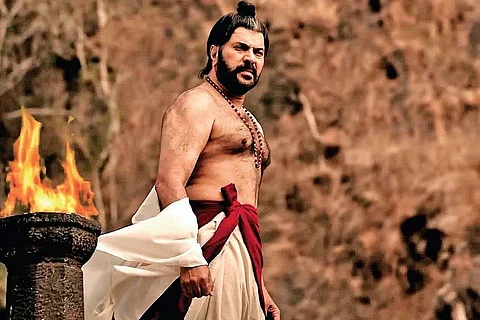

After controversy and tugs of war, the ambitious Mamangam is finally here. But though the battle behind the scenes was fairly intriguing - full of alleged betrayals and twists - the film itself is astonishingly dull.
Set in the 17th century, the story is about the chavers, or suicide squad warriors, who were determined to challenge the Zamorin who'd caused dishonour to their land, Valluvanad. This should have made for a thrilling setup and one would imagine that the script would have plenty of scope for plotting, strategy and old time cunning. But as it turns out, the strategy of the warriors appears to have been nothing more than flinging themselves on the sword. Or at least, that's what the film will have us believe.
Directed by M Padmakumar, who gave us the gripping Joseph last year, Mamangam was originally written by Sajeev Pillai with Shankar Ramakrishnan replacing him for the dialogues and screenplay. One does not know which of these gentlemen is at fault but what they've given the audience is a tedious, underwhelming film. It begins with an introductory sequence where a VFX enhanced Mammootty, who plays Pannikar, leads the attack on the Zamorin at the Mamangam festival which used to take place once in 12 years. Everyone but Pannikar is killed. Cut to 24 years later, and Chandroth Panikkar (Unni Mukundan) tells his family that the Bhagavathy has appeared in his dreams and told him to go to the festival.
This is cue for much wailing and bravado in the Pannikar household where clearly, people only had conversations about death all the time. Chandroth's nephew, a young boy (Achuthan), also tells his uncle that he's had the same Bhagavathy vision, and off they go on an overly long journey to get killed. Meanwhile, the Zamorin's right-hand man (Siddique) is investigating the murder of someone close to the Zamorin -- and to nobody's surprise, the two subplots meet.
Though this is supposedly one of the most expensive films to come out of Malayalam cinema, Mamangam gives the distinct feel of watching a mega serial. The stunts don't look realistic at all, with the warriors flying in the air as if they were playing a quidditch match on invisible broomsticks. At the heart of Mamangam is an interesting idea -- the dilemma of a man who has grown up with bloodshed all around him but decides to walk away from it. What were his reasons? How did he battle his inner demons? How did he come to terms with his community's perception of him? With a fine actor like Mammootty on board, it would have been rewarding to delve into these questions on screen -- remember Chanthu of Oru Vadakkan Veeragatha? What we get instead is a Wikipedia summary of the chavers that barely moves us.
Mammootty also plays an effeminate artist (and this character is introduced with a background score that's supposed to get us giggling), but it isn't a role that rises above that of a caricature. That said, the actor does well with what he's given.The women characters have precious little to do other than weep and spout lines about bearing babies who are meant to die. Prachi Tehlan's Unnimaya is the only one who has other aspirations -- namely, briefly wield a sword and then perform a medieval times item number about a mookuthi.
The half-baked writing fails to evoke any kind of emotion in the viewer because none of the relationships are explored. Unni Mukundan glowers and shakes his hair about, Achuthan looks stoic all through, and Mammootty has a faintly regretful expression on his face, as if he's realised that he's walked into yet another bad film. Manikandan Achari plays the token faithful lower caste man while Manikuttan's Moyin is the good Muslim to balance the bad Muslim Samar Koya (Tarun Arora). The editing leaves much to be desired, especially in the latter half when the film seems never-ending.
It's true that a film set in medieval times should reflect the politics of the society at that point. But the skill of the storyteller comes in how s/he interprets history with the advantage of the knowledge that the present gives them. Mamangam is sadly short on this perspective, offering instead a generic and bland tale that does no justice to its lead actor's potential.
Disclaimer: This review was not paid for or commissioned by anyone associated with the series/film. TNM Editorial is independent of any business relationship the organisation may have with producers or any other members of its cast or crew.